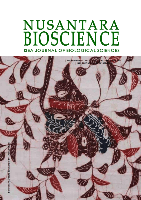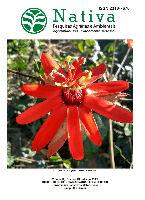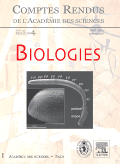
BIOLOGIA
Scope & Guideline
Navigating the intricacies of biology for a sustainable future.
Introduction
Aims and Scopes
- Aerobiology and Pollen Dynamics:
Research articles delve into the dynamics of airborne pollen and spores, including their concentrations, dispersal patterns, and their implications for health and environmental monitoring. - Bioaerosol Characterization:
Studies frequently assess the composition and impact of bioaerosols, including bacterial and fungal communities, in various environments such as urban, rural, and indoor settings. - Impact of Environmental Factors:
The journal highlights the interactions between environmental variables (e.g., pollution, climate) and biological particles, examining how these factors influence health outcomes and ecological dynamics. - Health Implications of Airborne Particles:
Research often investigates the health implications of exposure to airborne allergens and pathogens, emphasizing the relationship between air quality and public health. - Technological Advances in Monitoring:
The journal publishes innovative methodologies for monitoring airborne biological particles, including advancements in automatic detection and analysis techniques.
Trending and Emerging
- Climate Change and Airborne Allergens:
Research increasingly focuses on the impact of climate change on pollen production and distribution, highlighting the health risks associated with changing allergenic profiles. - Integration of AI in Aerobiology:
There is a growing trend towards incorporating artificial intelligence and machine learning in the monitoring and analysis of pollen and bioaerosol data, enhancing predictive capabilities. - Health Risk Assessment Related to Bioaerosols:
An emerging theme involves the assessment of health risks associated with bioaerosols, particularly in connection to respiratory diseases and allergies, as public health concerns rise. - Microbial Diversity in Airborne Samples:
Studies focusing on the diversity of microbial communities in the air, including their ecological roles and potential pathogenicity, are increasingly prominent. - Real-Time Monitoring Technologies:
The journal is seeing a rise in research dedicated to the development and implementation of real-time monitoring technologies for airborne biological particles, reflecting a shift towards timely data collection.
Declining or Waning
- Traditional Indoor Air Quality Studies:
Research focusing solely on traditional indoor air quality without integrating biological aspects has seen a decline, as the journal increasingly emphasizes the role of bioaerosols. - Historical Context of Aerobiology:
Studies that primarily focus on historical data or past events in aerobiology are becoming less frequent, as the journal shifts towards current trends and real-time monitoring. - General Environmental Studies:
While the journal still publishes articles related to environmental science, there is a noticeable decrease in generalized environmental studies that do not specifically address the biological components of air quality.
Similar Journals

Nusantara Bioscience
Pioneering Research for a Healthier TomorrowNusantara Bioscience is a prominent open-access journal dedicated to the field of biosciences, published by the Masters Program in Public Health at UNIV SEBELAS MARET in Surakarta, Indonesia. Since its inception in 2009, this journal has made significant contributions to the global discourse on biological sciences, environmental health, and public health research, providing researchers and professionals with an essential platform for sharing their findings. The journal, which holds an ISSN of 2087-3948 and an E-ISSN of 2087-3956, is committed to maintaining high academic standards while ensuring accessibility to quality research outcomes. Nusantara Bioscience enables a diverse audience, from students to seasoned researchers, to disseminate impactful studies and advance knowledge in the biosciences, reflecting the evolving challenges and innovations within the field.

Botany
Innovating methodologies for a greener future.Botany is a premier academic journal published by Canadian Science Publishing, dedicated to advancing the understanding of plant sciences and ecological systems. With an ISSN of 1916-2790 and an E-ISSN of 1916-2804, this journal has established itself as a respected publication in the fields of Ecology, Evolution, Behavior and Systematics, and Plant Science, reflected in its 2023 Q2 and Q3 rankings. Covering a wide range of topics, Botany is committed to fostering interdisciplinary research, promoting innovative methodologies, and disseminating significant findings from both theoretical and applied perspectives. Based in Ottawa, Canada, the journal is open access, ensuring that high-quality research is accessible to a global audience, thereby playing a crucial role in the dissemination of knowledge in the scientific community. With convergence years from 2008 to 2024, it continues to evolve alongside the scientific advancements in botanical studies, making it an essential resource for researchers, professionals, and students alike.

INDIAN JOURNAL OF EXPERIMENTAL BIOLOGY
Connecting Ideas, Inspiring Solutions in BiologyINDIAN JOURNAL OF EXPERIMENTAL BIOLOGY, published by the NATL INST SCIENCE COMMUNICATION-NISCAIR, stands as a significant platform for the dissemination of original research in the fields of biochemistry, genetics, and molecular biology, particularly within the context of Indian scientific advancements. With its ISSN 0019-5189 and E-ISSN 0975-1009, the journal has been an essential resource since its inception in 1965, although coverage in prominent databases like Scopus was discontinued in 2018. The journal ranks in the 57th percentile for Biotechnology, as well as in the 27th and 25th percentiles for Molecular Biology and Cell Biology respectively, underscoring its impact and relevance. While currently not an Open Access journal, it continues to provide valuable insights and contributions from researchers and professionals in the growing field of experimental biology. The esteemed contributions published in this journal enhance our understanding of biological processes and foster the development of innovative solutions to contemporary challenges in health and environmental science.

IMA Fungus is an esteemed open-access journal published by BMC, dedicated to advancing research in the fields of fungi, plant sciences, and ecological systems. With an ISSN of 2210-6340 and E-ISSN 2210-6359, this journal has been an influential platform since its inception in 2010, contributing significantly to the scientific community in the United States and beyond. The journal’s remarkable impact can be seen in its Q1 quartile rankings across multiple categories, including Agricultural and Biological Sciences, Ecology, Evolution, Behavior and Systematics, and Plant Science, positioning it among the top literary sources in these fields. Notably, IMA Fungus holds impressive Scopus rankings, with the Agricultural and Biological Sciences category placing it in the 98th percentile, evidencing its crucial role in disseminating impactful research. Given its commitment to fostering accessibility and collaboration, IMA Fungus continues to be an invaluable resource for researchers, professionals, and students aiming to explore and understand the complex roles of fungi within various ecosystems.

Nativa
Connecting researchers to enhance our natural resources.Nativa, published by the Universidade Federal de Mato Grosso in Brazil, stands as a prominent open-access journal since 2013, dedicated to the dissemination of research across various domains of Agricultural and Biological Sciences. With its ISSN 2318-7670, Nativa aims to foster scholarly communication and collaboration among researchers and practitioners worldwide. The journal occupies notable positions within the Scopus rankings, with a Q3 classification in several categories, including Agricultural and Biological Sciences (miscellaneous) and Environmental Science (miscellaneous), while also holding a Q4 classification in areas such as Agronomy and Crop Science and Animal Science and Zoology. This positioning reflects its commitment to advancing knowledge and understanding crucial to sustaining and enhancing our natural resources. Nativa seeks to engage a diverse readership by providing a platform for innovative research, fostering interdisciplinary discourse, and addressing pressing environmental challenges and conservation efforts essential for sustainable development.

CYBIUM
Exploring the depths of fish biology and ecology.CYBIUM is a reputable journal published by the Société Française d'Ichtyologie, dedicated to advancing research within the fields of Animal Science and Zoology as well as Ecology, Evolution, Behavior and Systematics. With a commitment to fostering scientific dialogue, CYBIUM has been a valuable resource for scholars since its inception in 1996, reporting on a wide array of ichthyological studies and aquatic biology. The journal is recognized in the 2023 Scopus rankings with a notable position in the Q3 quartile for Animal Science and Zoology and Q4 for Ecology, Evolution, Behavior and Systematics, reflecting its growing influence in these disciplines. Although currently not categorized as Open Access, CYBIUM continues to provide essential insights into fish biology and ecology from the heart of France, the Museum national d'Histoire naturelle in Paris. Researchers, professionals, and students in related fields will find CYBIUM an indispensable tool for staying informed about the latest developments and research trends within ichthyology and marine sciences.

Biologia Futura
Elevating Knowledge in Biochemistry and BeyondBiologia Futura, an esteemed journal published by SPRINGER HEIDELBERG, serves as a vital platform for researchers and professionals in the fields of Agricultural and Biological Sciences, as well as Biochemistry, Genetics, and Molecular Biology. Established in Hungary, this journal has been at the forefront of scientific inquiry since its inception in 2019 and continues to contribute significantly to advancing knowledge through rigorous peer-reviewed articles. With current rankings placing it in the second quartile for Agricultural and Biological Sciences and third quartile for Biochemistry, Genetics, and Molecular Biology according to Scopus metrics, it reflects a robust academic quality and reach. Scholars are encouraged to share their original research, reviews, and innovations that intersect these dynamic fields. Although not an open access publication, Biologia Futura ensures wide dissemination of high-impact research from its notable address at Tiergartenstraße 17, D-69121 Heidelberg, Germany, aiming to foster collaboration and discovery within the global scientific community.

Applied Biological Research
Elevating Academic Discourse in Biochemistry and GeneticsApplied Biological Research is a dynamic journal issued by the CENTRE ADVANCEMENT APPLIED SCIENCES, specializing in the interdisciplinary fields of biochemistry, genetics, and molecular biology. With its ISSN 0972-0979 and E-ISSN 0974-4517, this journal serves as a critical platform for the dissemination of peer-reviewed research that addresses pressing challenges and innovations within biological sciences. Although currently it does not adopt an Open Access model, it is dedicated to fostering academic discourse through rigorous publication practices. The journal's impact is underscored by its Scopus rankings, which place it in the 4th and 2nd percentiles in respective categories, emphasizing its emerging influence in the scientific community. Covering research from 2020 to 2024, Applied Biological Research is positioned as an essential read for researchers, professionals, and students seeking to stay at the forefront of biological research and application. Based in the beautiful region of Jammu & Kashmir, India, this journal is committed to advancing applied sciences through innovative research and outreach.

PAKISTAN JOURNAL OF ZOOLOGY
Fostering collaboration for a thriving zoological community.Pakistan Journal of Zoology, established in 1975 and published by the Zoological Society of Pakistan, is a pivotal resource in the field of zoology and animal science, contributing to the academic discourse and research advancements in the region. With an ISSN of 0030-9923, this journal strives to disseminate innovative research findings and scholarly articles that explore various facets of animal biology, ecology, and conservation. Although classified in the Q4 quartile within the animal science category, its commitment to providing a platform for emerging researchers makes it crucial for those in the zoological community. The journal covers a broad range of topics relevant to contemporary issues in zoology, promoting both local and international collaborations. Situated in Lahore, Pakistan, its contributions are vital for promoting biodiversity awareness and conservation efforts within the region. Accessible research outputs empower students and professionals alike to engage in critical discussions and applications within the disciplines of zoology and animal science.

COMPTES RENDUS BIOLOGIES
Bridging Gaps in Biochemistry and Molecular BiologyCOMPTES RENDUS BIOLOGIES, published by the esteemed Académie des Sciences, is a prominent journal based in France that contributes significantly to the fields of Agricultural and Biological Sciences, Biochemistry, Genetics and Molecular Biology, as well as Immunology and Microbiology. With a notable Q3 ranking in several categories as of 2023, this journal serves as an essential platform for disseminating groundbreaking research and advancements in these disciplines. Access is currently available under open access options, enhancing the reach and accessibility of its published findings. The journal has been in continuous publication since 1959, with a current focus extending to 2024, ensuring that it remains at the forefront of scientific communication. With its diverse scope and commitment to quality research, COMPTES RENDUS BIOLOGIES plays a crucial role in fostering dialogue and collaboration among researchers, professionals, and students who are dedicated to understanding and addressing complex biological questions.